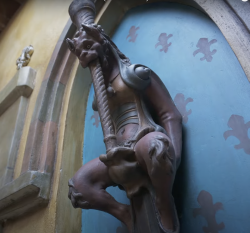South Secrets
The Commander brings our boy
into white-wall chambers with cots.
The Young Cosmonaut sits so still
and upright on fine silken sheets
for a good couple hours. He needs
a reprieve from all the informing.
Commander Zentrik comes to say
one last thing before slumber takes,
reviving them tomorrow morning.
They further go over some nuances.
"Do not be dismayed. After all, son,
it is you who is chosen for this thing
for reasons beyond comprehension.
"Tomorrow there will be breakfast
in the kitchen quarters, that-a-way;
then we will discern a dominance,
reeling in a holograph presentation
of the light which fate has called
upon us to carry out. A collection
of truly heavenly conversations is
awaiting your observances. South
Secrets never succumb to failing
but instead are underlying strides.
"The righteous robots will guide ye
into the flamboyant faithful vortex
of wise technological sums." Zentrik
then leaves the little chap to peace.
"Good night. Get some happy sleep."
Soon our Young Cosmonaut snores.

I think that, for any reader
I think that, for any reader of this series, the questions are piling up rapidly. Cosmonauts?---that implies a Soviet presence in the conquest of space; or it is just a word that passed into the language of that time, a more successful passing than, say, the American term "astronaut"? No, I am not asking you to tip your hand with answers or explanations; I am simply demonstrating the kinds of questions that successful science fiction, be it poetry or prose, raises in the ordinary reader. Are you familiar with the science fiction of Cordwainer Smith? I highly recommend him for your reading list. He wrote prose science fiction, and all but a handful of his stories take place in, describe, partly explain, and extend a vast future vision of an interstellar civilization that began with humans on earth and then exploded out into the cosmos. The artistic control he exerted upon his material is very evident, and is also very skilled and very subtle. He is "required reading" (so to speak) to anyone who is creating a coherent and internally consistet science fiction vision. The late Iain Banks' sciece fiction series is a more recent example of the same kind of writing. Your very original series reminds me of theirs (although i have read little of Banks'). I aoplaud the work you are doing within this science fiction tradition.
Starward
Gracias Senor Starward
The usage of the term "cosmonaut" rather than "astronaut" is majority influenced by Stanislaw Lem's novella, The Futurological Congress, a sci-fy satire. Lem was a 20th century Polish writer whom I enjoyed reading during highschool. Also I must thank you for your literary recommendations.
bananas are the perfect food
for prostitutes
Thank you for that reply, and
Thank you for that reply, and for reminding me of what I had stupidly forgotten: Lem's science fiction, which I have not read, although I have read a bit about it. I also mentioned, in a comment on one of the other poems in this series, James Tiptree Jr., whose future cosmology is a little less obvious than Cordwainer Smith's; and, perhaps, a little more subtle. (I love and admire Smith's creation; but I have found Tiptree's work equally entertaining.) Tiptree drops hints, that are often left unexplained; whereas Smith is far more explanatory. Despite my tremendous respect for Smith, I will say here that the ambience you have constructed in the poems is much more like ambient music, and like Tiptree's cosmology: in the background, as needed, but not intrusive upon the narrative. I think this kind of artistic decision, which you have obviously made in the poems of this series, bespeaks a very poetic view of the material; and is another reason why I applaud this sequence and urge you to extend it as far as your inspiration and inclination might take it. I think this series is a very unusual part of postpoems, in the best possible meaning of "unusual." I think you are setting an example, and blazing a parth, of which few if any poets here have thought. And that adds so much iridescence to your poetry.
Starward